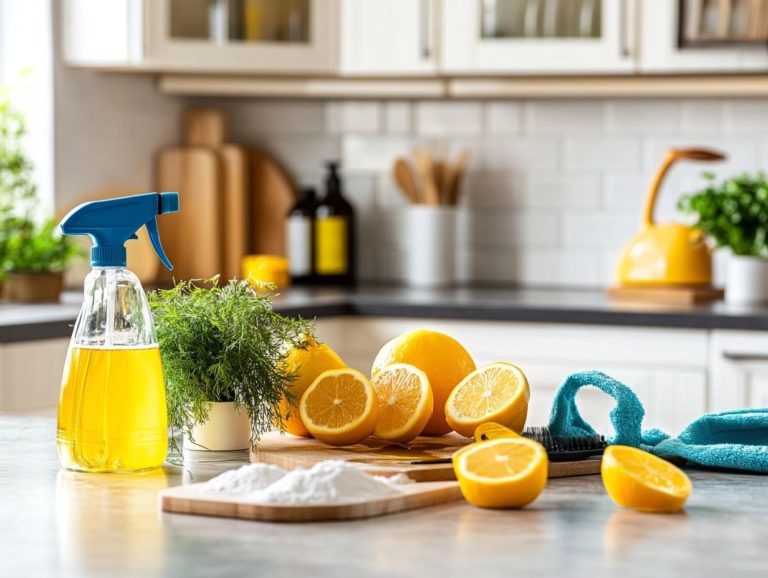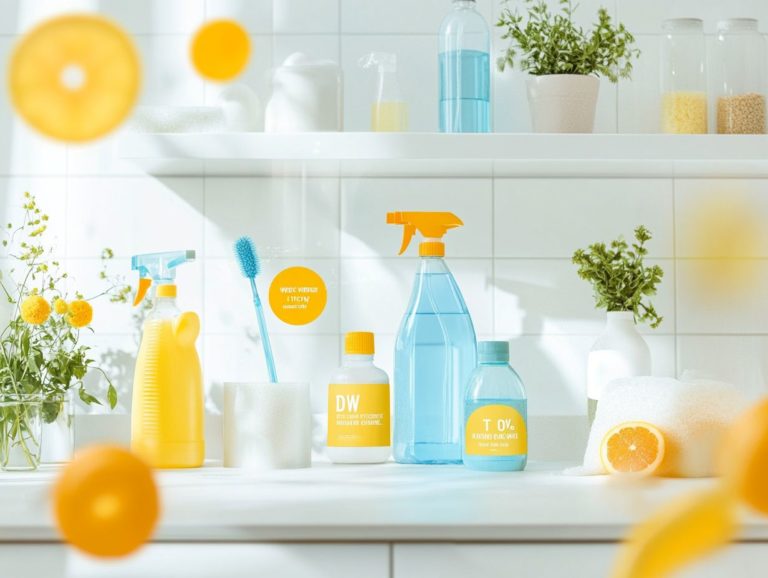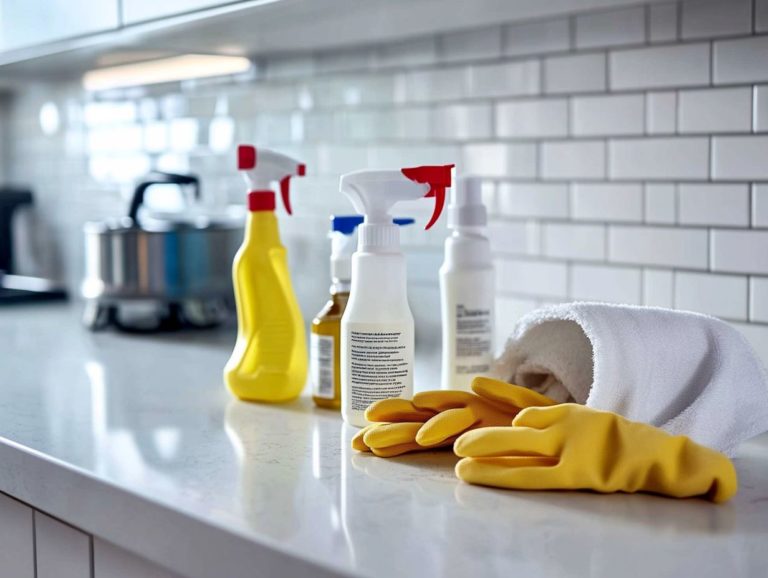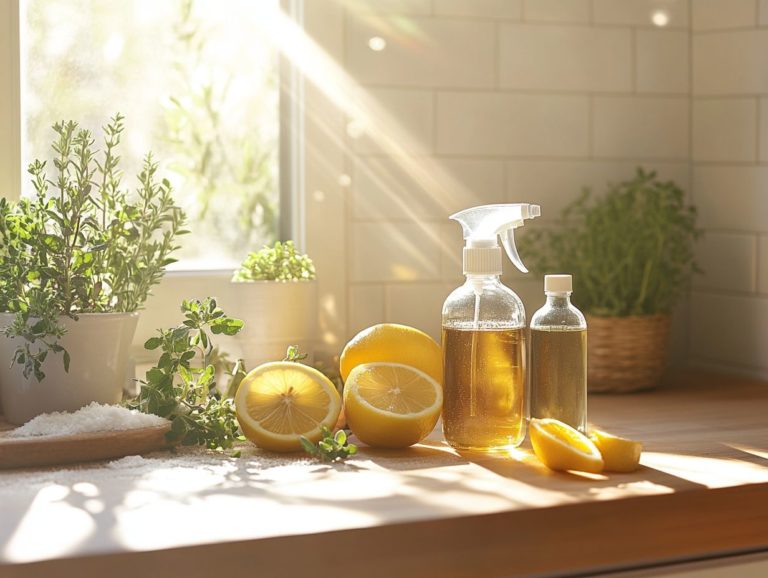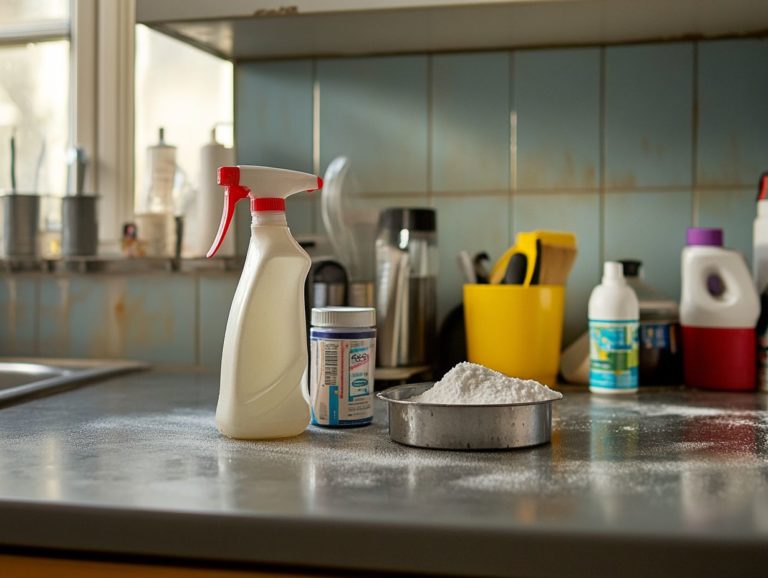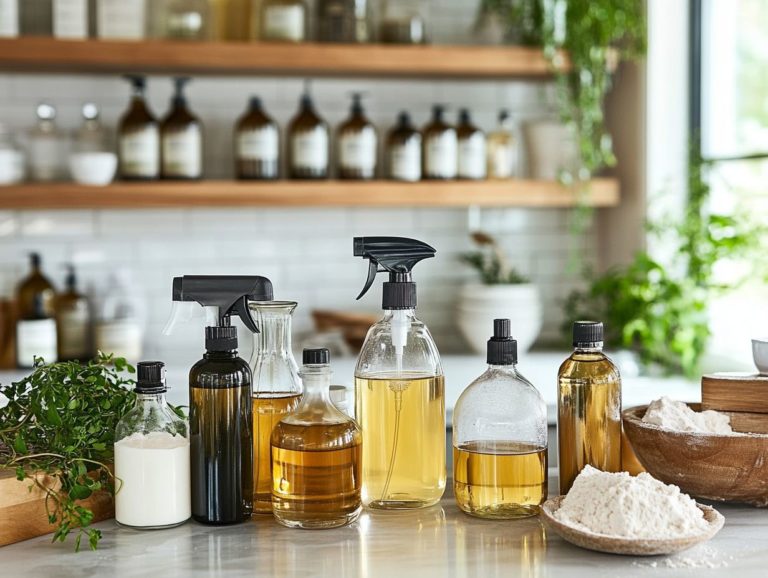Can Essential Oils Replace Traditional Cleaners?
Essential oils have captured attention not only for their enchanting aromas but also for their remarkable potential as effective cleaning agents and essential components of DIY cleaning recipes.
Get ready to explore the versatile realm of essential oils, uncovering their numerous benefits and common varieties.
We will also cover essential safety considerations for cleaning purposes, especially when compared to conventional cleaning products.
The discussion includes their effectiveness against stains and germs, a thoughtful comparison to conventional cleaners, and practical tips for integrating them into your daily routine.
Prepare to discover how these natural alternatives can add a fresh scent to your cleaning regimen, elevating it to new heights of freshness while providing significant health benefits for you and your pets.
Contents
- Key Takeaways:
- What Are Essential Oils?
- How Are Essential Oils Used for Cleaning?
- Are Essential Oils Safe for Cleaning?
- Can Essential Oils Effectively Clean?
- Can Essential Oils Replace Traditional Cleaners?
- How to Incorporate Essential Oils into Your Cleaning Routine?
- Frequently Asked Questions
- Can Essential Oils Replace Traditional Cleaners?
- Why Choose Essential Oils for Your Cleaning Needs?
- Which Essential Oils Are Best for Cleaning?
- How Do I Use Essential Oils for Cleaning Purposes?
- Do Essential Oils Disinfect and Kill Germs Like Traditional Cleaners?
- What Precautions Should I Take When Using Essential Oils as Cleaners?
Key Takeaways:
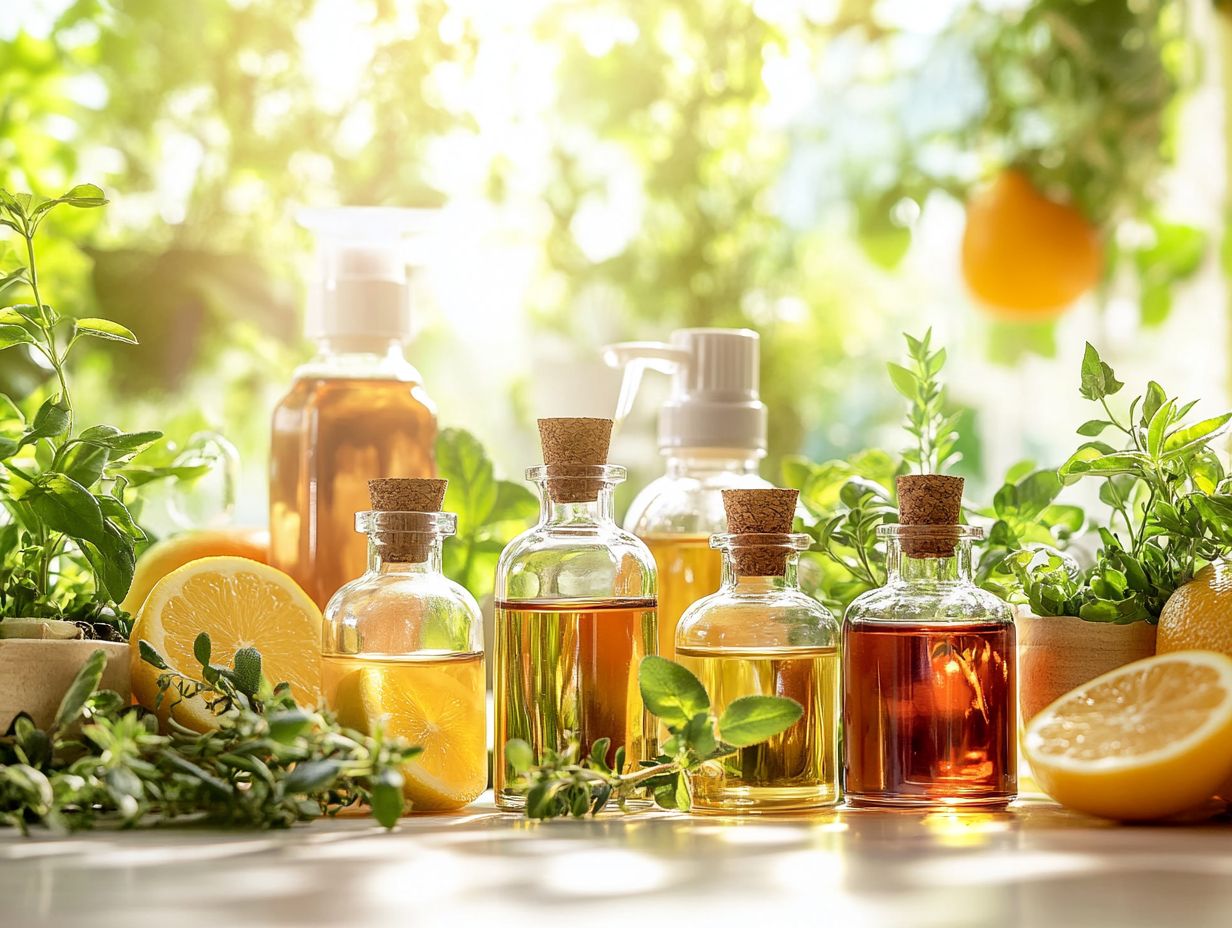
- Essential oils can be used as a natural and safe alternative to traditional cleaners and chemical cleaners for cleaning purposes.
- Some potential risks and precautions should be taken when using essential oils for cleaning, such as diluting them properly and avoiding direct contact with skin.
- Essential oils can effectively clean a variety of surfaces and remove stains, but they may not be as effective against bacteria and germs as traditional cleaners in certain situations.
What Are Essential Oils?
Essential oils are concentrated aromatic compounds extracted from a variety of plants. They are very effective natural cleaners for your home.
Oils like lemon, tea tree, eucalyptus, and lavender not only boast delightful fragrances but also possess natural antibacterial and disinfectant properties, making them perfect alternatives to chemical cleaners.
Their unique properties enhance your cleaning experience and contribute to a healthier living environment especially important if you share your space with pets.
With the rising demand for organic essential oils, respected brands such as AromaForce and Aura Cacia are stepping up, offering high-quality products tailored for your DIY cleaning endeavors.
How Are Essential Oils Used for Cleaning?
Essential oils serve as powerful allies in your DIY cleaning endeavors, making your home cleaner and fresher.
By blending essential oils with everyday household staples such as vinegar or distilled water or even mixing them into commercial cleaners like Scrubbing Bubbles and Germaphobe Cleaner you can create a cleaning mixture that can be used on many surfaces.
These combinations also smell wonderful and tap into the natural antibacterial and disinfectant properties of oils like tea tree and lemon essential oil, ensuring your space is both fresh and hygienic.
What Are the Benefits of Using Essential Oils for Cleaning?
The benefits of using essential oils for cleaning are truly remarkable. They offer a blend of potent antibacterial properties and health advantages that make them an appealing alternative to harsh chemical cleaners.
Essential oils like eucalyptus and lavender not only eradicate bacteria but also create a fresh and inviting atmosphere. This promotes a healthier indoor environment and helps you avoid the negative effects of synthetic fragrances commonly found in conventional cleaning products.
By incorporating these essential oils into your regular cleaning routines, you can significantly reduce your exposure to harmful chemicals that often linger in the air and settle on surfaces throughout your home.
This practice not only improves air quality but also enhances your mental well-being, as the soothing aromas can effectively alleviate stress and encourage relaxation.
Embracing essential oils as natural disinfectants gives you the power to maintain a cleaner living space while remaining conscious of your health and the health of the planet.
They provide a sustainable and effective solution for keeping your home fresh and clean, all while nurturing a more harmonious environment.
Start your journey to a cleaner, healthier home today!
What Are the Most Common Essential Oils Used for Cleaning?
Among the most commonly used essential oils for cleaning are lemon essential oil, tea tree oil, eucalyptus essential oil, and lavender oil.
Each of these oils offers distinct properties that elevate your cleaning solutions, much like professional cleaning products. For example, when you add lemon essential oil to a vinegar solution, it deftly tackles stubborn grime on surfaces.
This leaves behind a bright and refreshing scent. Tea tree oil can be seamlessly integrated into your all-purpose cleaners to effectively combat unwanted germs, particularly in the kitchen and bathroom.
On the flip side, eucalyptus essential oil excels as a natural disinfectant in your laundry routine, ensuring your clothes smell fresh while banishing bacteria. Lavender oil, with its calming aroma, can enhance home sprays to create a soothing ambiance that promotes relaxation, even amidst cleanup tasks.
Are Essential Oils Safe for Cleaning?
While essential oils provide a wealth of health benefits and function as effective natural cleaners, safety is very important when incorporating them into your cleaning routine.
When used correctly, essential oils can be a safe and non-toxic alternative to many chemical cleaners that may carry health risks. However, you need to understand the proper usage and potential sensitivities linked to different essential oils, particularly in households with pets or small children.
What Are the Potential Risks of Using Essential Oils for Cleaning?
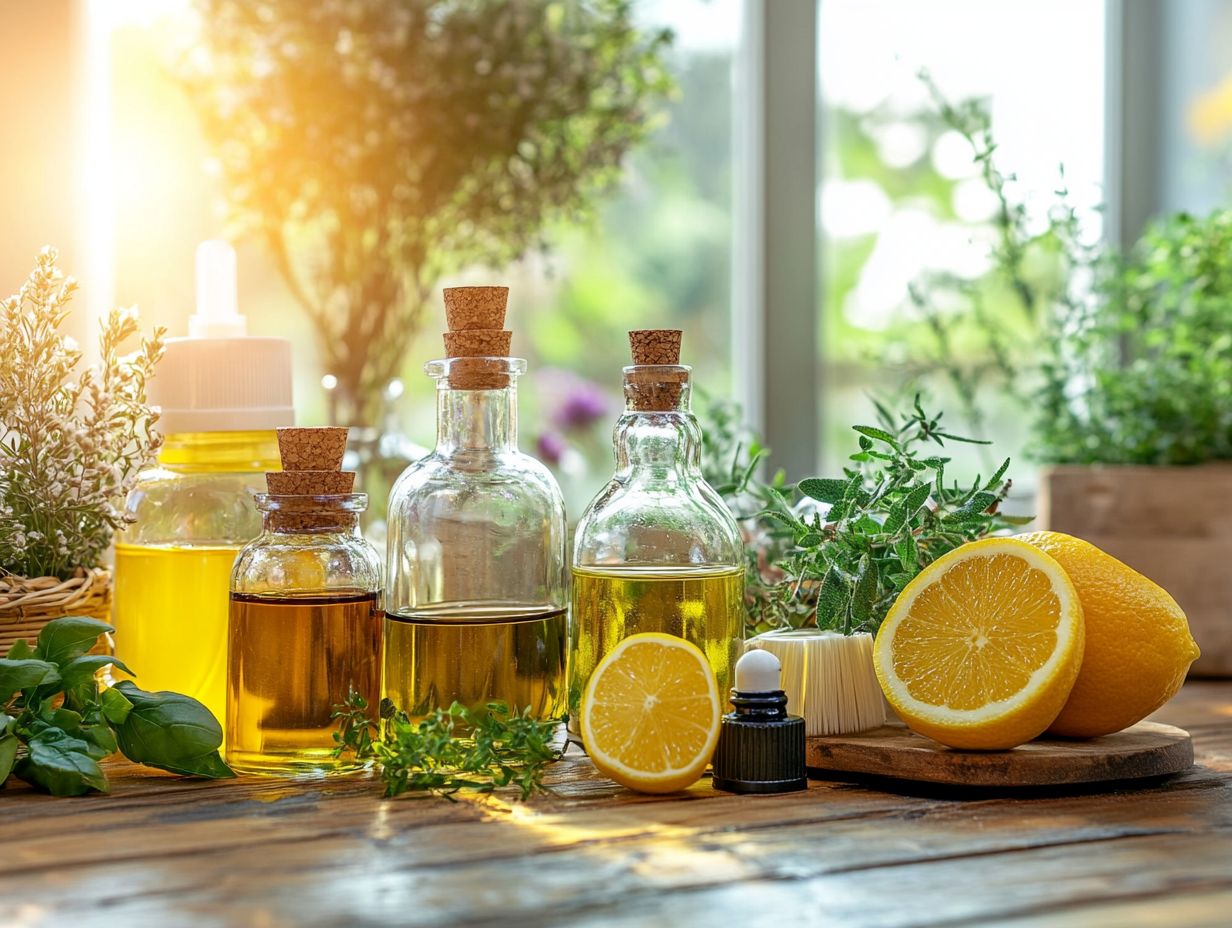
While essential oils are widely regarded as safe, you should be mindful of the potential risks linked to their use in cleaning. Misuse or improper dilution can lead to issues.
Certain essential oils may cause skin irritation, allergic reactions, or respiratory issues, especially in sensitive individuals, children, or pets. Know the specific oils you re using and their properties.
For example, oils like tea tree, eucalyptus, and peppermint can offer remarkable antibacterial benefits. However, they also carry the risk of unwanted health issues if not used with caution.
To mitigate these risks, always dilute essential oils with a carrier oil or water before applying them. Conduct a patch test applying a small amount of diluted oil to your skin to check for reactions prior to widespread use.
Ensure good ventilation in areas where essential oils are utilized to significantly reduce respiratory discomfort.
Understanding which essential oils are safer and how to use them appropriately helps you maintain a healthy cleaning environment.
How Should Essential Oils Be Used Safely for Cleaning?
To ensure you re using essential oils safely for cleaning, follow guidelines that emphasize proper dilution and application techniques.
This approach helps you enjoy all the amazing benefits while minimizing any associated risks. Typically, essential oils should be diluted with carrier oils or liquids like vinegar or distilled water, and used in appropriate quantities.
A mixture of 1-2% essential oil in a carrier is perfect for most cleaning tasks, meaning you should aim for about 6-12 drops of essential oil per ounce of carrier liquid.
Consider using lemon oil for tackling grease; it s excellent at cutting through grime. Tea tree oil is fantastic for its antibacterial properties, making it ideal for sanitizing high-touch areas.
Don t forget to store your essential oils in dark glass containers in a cool, dry place to maintain their potency. It s also important to label all your mixtures clearly for safety and easy identification.
Key Safety Points:
– Always dilute essential oils before use.
– Conduct a patch test on skin to check for allergic reactions.
– Use appropriate dilution ratios for cleaning.
– Store oils properly to maintain potency.
Can Essential Oils Effectively Clean?
Essential oils are taking the cleaning world by storm with their natural benefits! They provide a great option for cleaning, serving as a natural alternative to traditional cleaning products.
These oils have inherent antibacterial properties that give them the power to tackle dirt, grime, and bacteria in your home.
Oils like tea tree and lemon essential oil are particularly effective for creating potent cleaning solutions, delivering a deep clean without the need for harsh chemicals. Embracing these oils enhances your cleaning routine and promotes a healthier environment.
What Surfaces Can Essential Oils Clean?
Essential oils are your secret weapon for cleaning a variety of surfaces in your home, from countertops and floors to bathrooms, making them incredibly versatile natural cleaners.
Their remarkable ability to cut through grease and grime, combined with their antibacterial properties, allows you to tackle a wide range of cleaning tasks effectively. This means you can keep your surfaces clean and hygienic without resorting to harsh chemical cleaners.
For example, a simple mixture of tea tree oil and water works wonders on your bathroom tiles, effectively combating mold and mildew. In the kitchen, a blend of lemon essential oil with vinegar not only leaves your countertops sparkling but also fills your space with a refreshing scent.
When it comes to hardwood floors, a diluted mixture of lavender oil offers cleanliness and a calming aroma.
Start using these essential oils in your cleaning today to enjoy a healthier home and a more enjoyable cleaning experience!
What Stains Can Essential Oils Help You Remove?
Essential oils are effective for banishing a variety of stains, from grease and ink to pesky food spills. Take lemon essential oil, for instance; it s renowned for its grease-lifting prowess, while tea tree oil tackles stubborn spots like ink or mold.
Let s not overlook lavender essential oil, which brings soothing properties to the table. It s particularly effective against food-related stains like wine or juice, leaving your fabrics not only clean but also delightfully fresh-smelling.
When you’re facing that greasy nemesis, a blend of lemon oil and baking soda creates a powerful paste that takes stain removal to the next level. For those ink stains, mixing tea tree oil with rubbing alcohol can effectively break down those stubborn pigments.
By utilizing the strength of these essential oils alongside simple household items, you can tackle tough stains in an effective, eco-friendly, and safe manner for everyone in the family.
Are Essential Oils Effective Against Bacteria and Germs?
Essential oils are renowned for their potent antibacterial properties, making them an effective defense against the myriad of bacteria and germs that often inhabit our homes.
Oils such as tea tree and eucalyptus essential oil have demonstrated their ability to eliminate bacteria and fungi, offering a natural disinfectant alternative that is safer for your health compared to traditional chemical cleaners.
Research backs up these claims, with studies revealing that tea tree oil can inhibit the growth of various harmful bacteria, including Staphylococcus aureus and E. coli. Experts also emphasize the efficacy of lavender essential oil, which combats germs and promotes relaxation, providing you with a dual-purpose hygiene solution.
Oregano essential oil is another valuable player in this lineup, recognized for its broad-spectrum antibacterial effects that target pathogens which could jeopardize your overall health. By incorporating these essential oils into your cleaning routines, you can adopt a holistic approach to maintaining a clean and safe living environment.
Can Essential Oils Replace Traditional Cleaners?
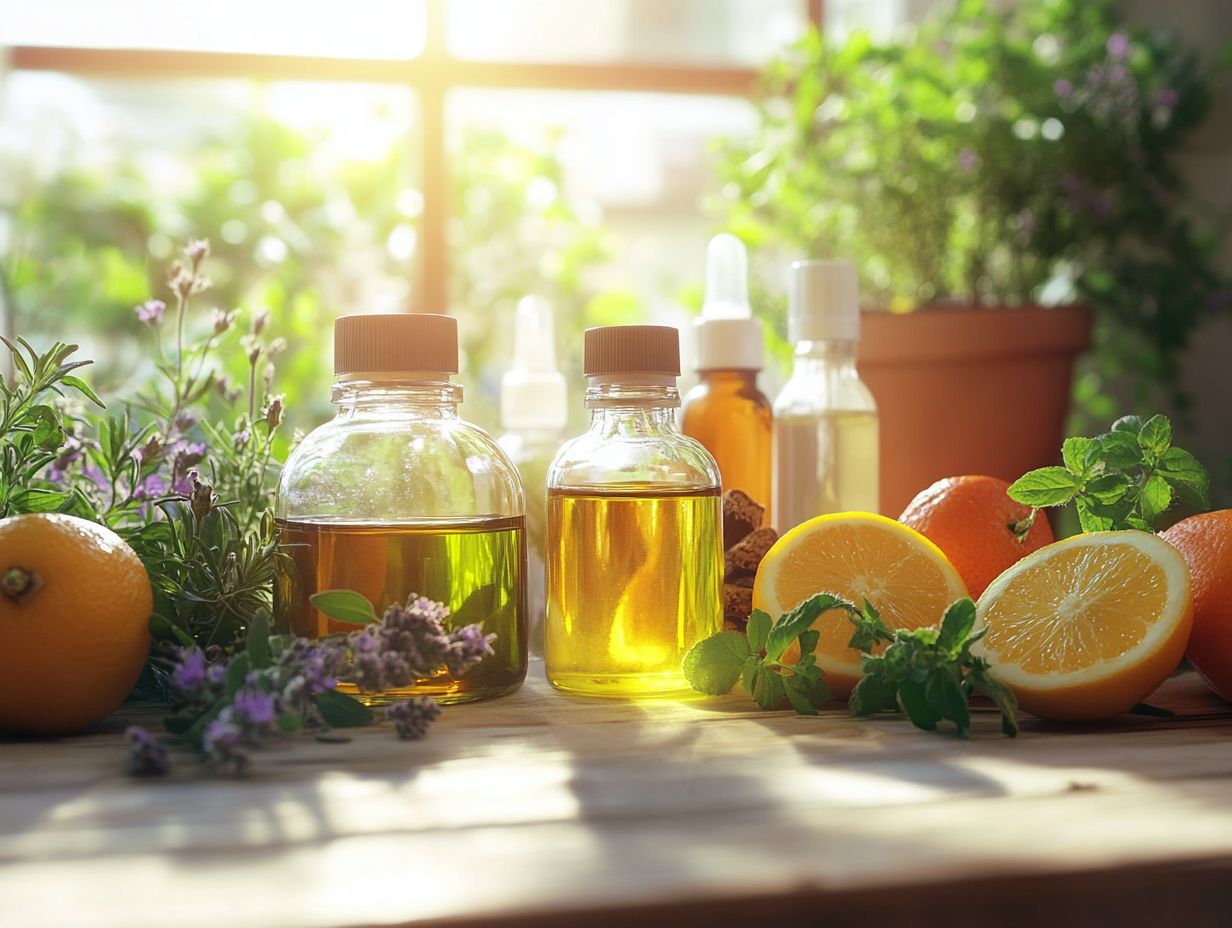
Essential oils hold remarkable potential to serve as a superior replacement for traditional cleaners in numerous cleaning applications, offering a potent and natural alternative to those chemical-laden products you might be accustomed to.
Increasingly, more households are now embracing essential oils, drawn in by their effectiveness, delightful aromas, and the pursuit of safer, eco-friendly cleaning solutions that maintain the highest standards of hygiene and cleanliness without compromise.
What Are the Differences Between Essential Oils and Traditional Cleaners?
The differences between essential oils and traditional cleaners primarily lie in their ingredients, effectiveness, and health benefits. While traditional cleaners are often packed with synthetic chemicals that can pose various health risks, essential oils present a natural alternative that effectively eliminates dirt and bacteria without harmful side effects.
This choice promotes better indoor air quality and enhances your overall well-being. It’s essential to recognize this distinction, especially as awareness grows regarding the potential hazards associated with long-term use of conventional cleaning products.
The ingredients commonly found in traditional cleaners can lead to respiratory issues, skin sensitivities, and environmental harm. In contrast, essential oils, derived from plants, harness the power of nature to deliver safe and effective cleaning solutions without toxic residues.
Their well-documented germ-fighting features enable them to combat germs efficiently. This shift toward using essential oils fosters healthier living spaces and aligns with a broader trend toward sustainability and mindfulness in home care.
Embracing this approach can significantly elevate the quality of your environment.
In What Situations Can Essential Oils Effectively Replace Traditional Cleaners?
Essential oils can be a fantastic alternative to traditional cleaners, especially in homes with children and pets where you re concerned about chemical exposure. For your everyday cleaning tasks like disinfecting countertops or sprucing up the bathroom essential oils such as tea tree or lavender can deliver impressive antibacterial properties and a delightful scent, all without introducing harsh chemicals.
When you re facing stubborn odors in the kitchen, oils like lemon and eucalyptus work wonders as natural deodorizers, transforming your kitchen into a fresh-smelling paradise! They cut through unwanted smells and leave behind a refreshing aroma.
In your laundry routine, adding just a few drops of lavender oil not only infuses your clothes with a lovely fragrance but also acts as a natural fabric softener. For those tricky cleaning challenges in high-moisture areas like bathrooms, peppermint oil shines with its antimicrobial benefits, making it an excellent ally for mold prevention.
These essential oils elevate your cleaning experience and contribute to a healthier home environment, allowing you to breathe easy and enjoy your space more fully. Now is the perfect time to switch to essential oils for a cleaner, healthier home!
Are There Any Instances Where Traditional Cleaners Are More Effective Than Essential Oils?
While essential oils present a myriad of benefits, there are moments when traditional cleaners outshine them, especially when it comes to heavy-duty stains or industrial cleaning challenges. Certain chemical cleaners are meticulously crafted for high-strength cleaning and can surpass the effectiveness of essential oils in situations like mold removal or industrial-grade sanitation.
For instance, when dealing with stubborn mold in damp areas such as basements or bathrooms, traditional anti-fungal cleaners often contain specialized ingredients designed to target and eradicate spores more efficiently than natural alternatives.
Similarly, in an industrial setting where hygiene is non-negotiable, powerful disinfectants are frequently necessary to meet stringent health regulations. In these scenarios, essential oils, while delightful and generally safer for many applications, simply don’t possess the potency required to tackle severe contamination effectively.
Therefore, while essential oils undoubtedly have their role in everyday cleaning and lighter tasks, it s crucial not to overlook the necessity of traditional cleaners in more demanding situations.
How to Incorporate Essential Oils into Your Cleaning Routine?
Incorporating essential oils into your cleaning routine can elevate your home cleaning tasks with ease, infusing delightful scents and harnessing natural cleaning power. To embark on this aromatic journey, consider crafting DIY cleaning recipes that blend essential oils with vinegar, distilled water, or other natural ingredients.
This method empowers you to craft powerful cleaning products tailored to your specific needs, ensuring a more sustainable and enjoyable cleaning experience.
What Are Some DIY Cleaning Recipes Using Essential Oils?
You ll find many DIY cleaning recipes featuring essential oils that allow you to customize your cleaning products to suit your preferences while enhancing their antibacterial properties. For example, a mixture of lemon essential oil and vinegar works wonders for kitchen surfaces. Meanwhile, a tea tree oil solution serves as an excellent disinfectant for the bathroom, promoting a healthy and natural approach to home cleaning.
These recipes not only create a refreshing atmosphere but also help you reduce reliance on harsh chemicals that may be detrimental to your health. Consider a simple blend of lavender essential oil and baking soda; it makes for an effective carpet deodorizer, leaving your carpets smelling delightful while tackling unpleasant odors.
Combining eucalyptus oil with water yields a versatile all-purpose cleaner that can be safely used on various surfaces, ensuring a natural shine and a pleasant aroma throughout your home.
Each of these recipes is thoughtfully designed to be both effective and environmentally friendly, appealing to those who prioritize cleanliness without compromising their health or the well-being of our planet.
How Can Essential Oils Be Used in Conjunction with Traditional Cleaners?
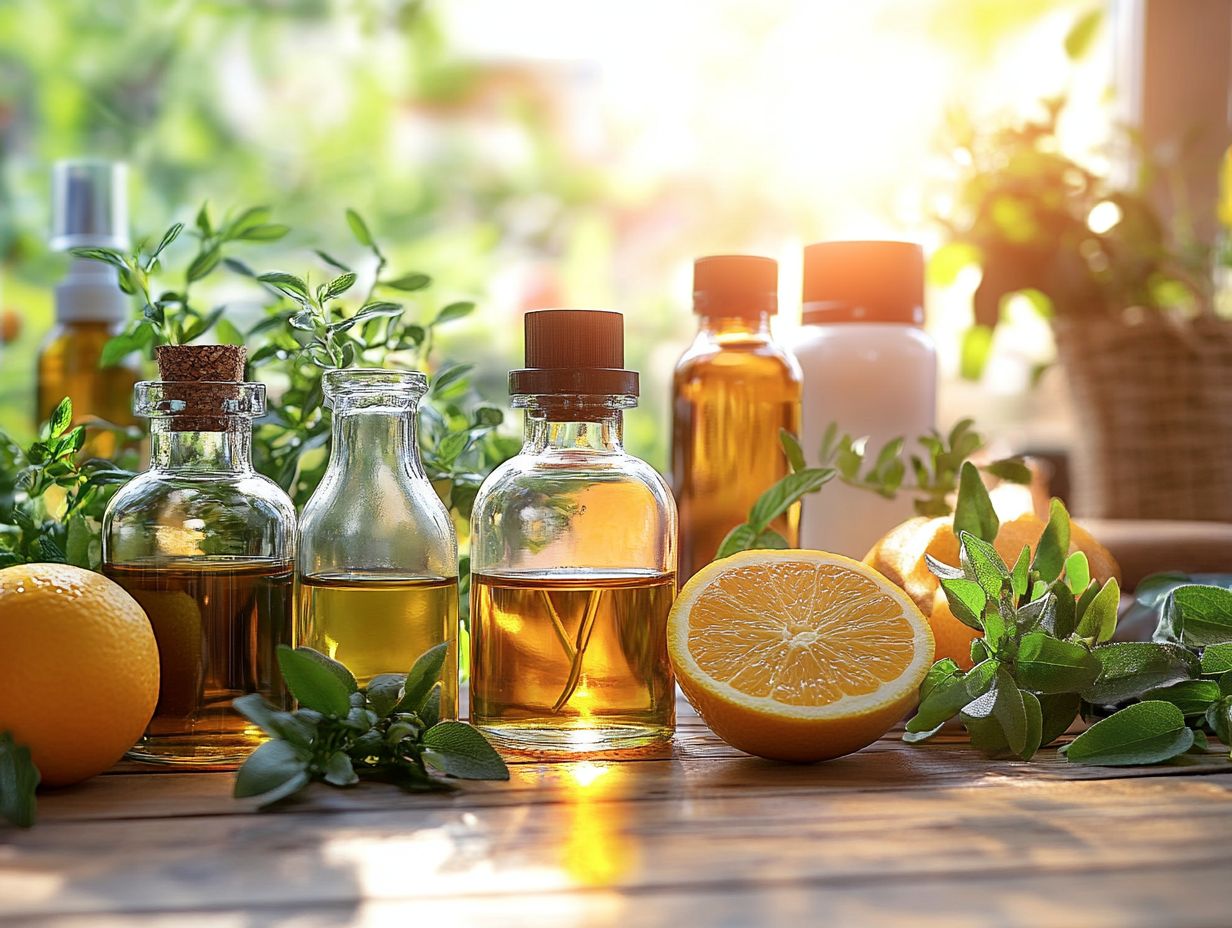
Essential oils can be a game-changer when used alongside traditional cleaners, enhancing their effectiveness while reducing your exposure to harmful chemicals. By simply adding a few drops of essential oils like eucalyptus or lavender to your conventional cleaning products, you not only create a more inviting aroma but may also give an antibacterial boost to your cleaning solution.
This practice doesn t just make your space smell divine; it transforms your entire cleaning experience into something more enjoyable. For example, mixing tea tree oil with all-purpose cleaners significantly amplifies their power against stubborn germs perfect for kitchens and bathrooms where sanitation is non-negotiable.
Incorporating citrus oils like lemon or orange into your surface cleaners can help cut through grease and grime while leaving behind a zesty freshness. This eco-friendly approach lessens your dependence on harsh chemicals, fostering a healthier living environment especially beneficial for families with young children or pets.
Frequently Asked Questions
Can Essential Oils Replace Traditional Cleaners?
Yes, essential oils can be used as natural alternatives to traditional cleaning products.
Why Choose Essential Oils for Your Cleaning Needs?
Essential oils are natural, non-toxic, and have antimicrobial properties, making them safe and effective for cleaning.
Which Essential Oils Are Best for Cleaning?
Citrus oils like lemon, orange, and grapefruit, as well as tea tree and peppermint, are popular choices for cleaning. However, any essential oil with antiseptic properties can be used.
How Do I Use Essential Oils for Cleaning Purposes?
Essential oils can be used on their own or mixed with other natural ingredients like vinegar and baking soda. They can also be diluted in water and used in a spray bottle.
Do Essential Oils Disinfect and Kill Germs Like Traditional Cleaners?
Yes, certain essential oils have powerful antiseptic properties that can effectively kill germs and bacteria, making them just as effective as traditional cleaners.
What Precautions Should I Take When Using Essential Oils as Cleaners?
It is important to properly dilute essential oils and avoid using them on sensitive surfaces. Some essential oils can also be toxic to pets, so it’s important to research and use them safely.

